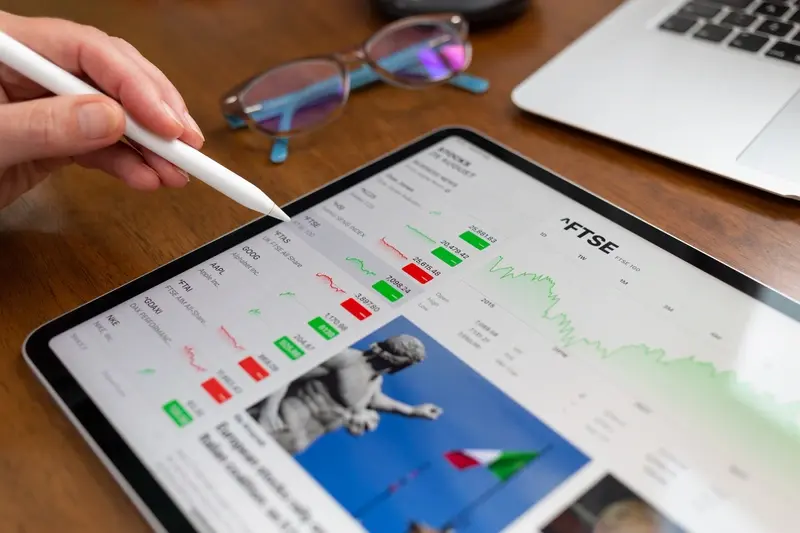
Share prices were effectively on hold on Thursday at midday in London, as market participants took on board economic data ahead of a string of key interest rate decisions next week.
Surprise rate hikes in Australia and Canada reduced certainty about what those decisions will be.
The FTSE 100 index was down 0.63 of a point at 7,623.71. The FTSE 250 was flat at 19,152.27 points. The AIM All-Share was down 0.43 of a point at 792.62.
The Cboe UK 100 was down 0.1% at 760.33, the Cboe UK 250 was up 0.1% at 16,728.02, and the Cboe Small Companies was down 0.1% at 13,321.44.
The Bank of Canada defied expectations on Wednesday and lifted its benchmark interest rate, after enacting successive pauses.
The decision came a day after the Reserve Bank of Australia hiked interest rates to an 11-year-high and warned that further rises may be on the horizon to get surging prices under control.
The moves ignited worries amongst markets that other - even more important - central banks may follow suit.
‘Canada and Australia don’t often have a central role in moving the markets, but the decision by both countries’ central banks to resume rate hikes this week has reverberated through the financial system and helped stoke fears about sticky inflation,’ says AJ Bell investment director Russ Mould.
‘Much of the narrative sustaining the uneven if material rally in stocks this year has been that the battle with inflation is nearly won by the central banks. If the Federal Reserve follows the lead of its Australian and Canadian counterparts then this could be badly undermined and the next Fed decision is now just a week away.’
The US Federal Reserve, the European Central Bank and the Bank of Japan which announce their own decisions next week. The Fed will announce its decision on Wednesday. The ECB and the BoJ will follow a day after.
According to the CME FedWatch Tool, markets see a 68% chance of the Fed holding interest rates steady next week, with the balance expecting another 25 basis point lift.
In European equities, the CAC 40 in Paris was up 0.4% and the DAX 40 in Frankfurt was up 0.3%, despite bad news for the eurozone economy.
The eurozone fell into recession in the first quarter of this year, according to Eurostat. Seasonally adjusted gross domestic product decreased by 0.1% in the first quarter from the fourth quarter of last year, after Eurostat revised down a forecast from May which had estimated slight growth.
For the fourth quarter of 2022, eurozone GDP was similarly revised down to negative 0.1%, from a previous estimate of flat on the third quarter.
This means eurozone GDP has contracted for two consecutive quarters, which is the definition of a recession.
Bert Colijn, senior eurozone economist at ING, said the downward revision was mainly due to Germany revising down its own numbers as new data came in.
For Andrew Kenningham, chief Europe economist at Capital Economics, the big picture was an eurozone economy that was ‘broadly stagnant’ over the past two quarters and was likely to contract again in the second quarter as the effects of monetary policy tightening continue to feed through.
The euro stood at $1.0730 midday Thursday, higher against $1.0705 at the London equities close on Wednesday.
Ricardo Evangelista, senior analyst at ActivTrades, said the euro found some support in relation to the greenback, as the ‘expected pause’ on the other side of the Atlantic is ‘unlikely to be matched by the European Central Bank’.
‘Core inflation remains a problem in the eurozone, and despite the region’s economic struggles the ECB is expected to continue to increase rates, as it battles to slow down the rising of consumer prices,’ he said.
In London, Vodafone was the worst blue-chip performer at midday, down 4.6%.
The stock finished 2.3% higher on Wednesday, amid a report by Reuters that the telecommunications provider is in the final stage of agreeing to merge its UK operations with Hong Kong conglomerate CK Hutchison.
According to Reuters, an announcement is expected as soon as Friday.
In the FTSE 250, FirstGroup soared 16% after it trebled its total dividend despite reporting a lower annual profit.
The public transport provider declared a final dividend of 2.9 pence per share, up from 1.1p per share a year ago. This brings the total dividend to 3.8p for financial 2023, more than tripled from 1.1p a year prior.
This was despite pretax profit in the year ended March 25 falling sharply to £128.7 million from £654.1 million the year prior, and revenue dropping 15% to £4.76 billion from £5.59 billion.
Crest Nicholson was the FTSE 250’s worst performer, down 8.5%.
The housebuilder swung to a pretax profit of £28.4 million for the half-year ended April 30, from a loss of £52.2 million at the same point last year.
However, revenue fell to £282.7 million from £364.3 million the prior year, and home completions dropped by 18% to 894 from 1,096 the previous year. The company said this reflected the economic uncertainty and lower confidence in the housing market.
Elsewhere in London, Galliford Try added 3.9%.
The construction company declared a 12 pence per share special dividend for the financial year ending on June 30, as it is set to receive a £26 million cash payment as a settlement of a long-standing contract dispute.
On AIM, RWS jumped 14% after it announced its intention to launch a £50 million share repurchase programme.
Chief Executive Officer Ian El-Mokadem said: ‘With our strong balance sheet and cash generation, we are actively pursuing acquisitions that could accelerate delivery of our medium-term plans. We are encouraged to see a much more exciting pipeline in the last six months which provides us with attractive opportunities to deploy our cash, and we are at an advanced stage with a number of bolt-on opportunities.’
Stocks in New York were called to open largely flat open on Thursday. The Dow Jones Industrial Average was seen completely flat, the S&P 500 index marginally higher, and the Nasdaq Composite up 0.1%.
On Wednesday, Wall Street had ended mixed, with sentiment knocked by the surprise move by the Bank of Canada.
The pound was quoted at $1.2465 at midday on Thursday in London, firm from $1.2459 at the equities close on Wednesday. Against the yen, the dollar was trading at JP¥139.80, slightly lower compared to JP¥139.85.
Brent oil was quoted at $77.43 a barrel at midday in London on Thursday, up from $77.24 late Wednesday. Gold was priced at $1,946.62 an ounce, lower against $1,954.11.
Still to come in Thursday’s economic calendar, the weekly US initial jobless claims report is released at 1330 BST.
Copyright 2023 Alliance News Ltd. All Rights Reserved.




